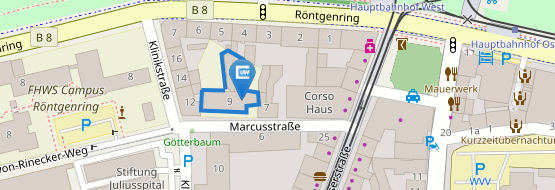Dr. Tobias Kaufmann, Dipl.-Biol.

Associated member: March 2011 - October 2013
Dissertation title: Brain Computer Interfaces based on event related potentials: toward fast, reliable and easy-to-use communication systems for people with neurodegenerative disease.
Abstract: Brain Computer Interfaces (BCI) provide an alternative communication channel for patients with impaired speech or motor functions. BCI control was found to vary strongly between users.The goal of this project is to improve BCI control by (1) understanding cortical correlates of BCI training, (2) predicting BCI control and by (3) providing users with feedback that may help to gain better performance.
Principal investigator:
Prof. Dr. Andrea Kübler
Department of Psychology I, Marcusstr. 9-11, 97070 Würzburg
https://www.psychologie.uni-wuerzburg.de/int/mitarbeiter/kuebler-andrea-prof-dr/
Current position:
Institute of Clinical Medicine, Faculty of Medicine, Oslo
http://www.med.uio.no/klinmed/english/people/aca/tobiaska/
Publications:
Kaufmann, T., Schulz, S. M., Köblitz, A., Renner, G., Wessig, C., & Kübler, A. (2013). Face stimuli effectively prevent brain-computer interface inefficiency in patients with neurodegenerative disease. Clinical neurophysiology: official journal of the International Federation of Clinical Neurophysiology, 124(5), 893-900.
<!--[if !vml]-->![]() <!--[endif]-->doi:10.1016/j.clinph.2012.11.006
<!--[endif]-->doi:10.1016/j.clinph.2012.11.006
Kaufmann, T., Völker S., Gunesch L. and Kübler A. (2012). Spelling is just a click away – a user-centered brain-computer interface including auto-calibration and predictive text entry. Front. Neurosci. 6:72.
<!--[if !vml]-->![]() <!--[endif]-->doi: 10.3389/fnins.2012.00072
<!--[endif]-->doi: 10.3389/fnins.2012.00072
Kaufmann, T., Vögele, C., Sütterlin, S., Lukito, S., & Kübler, A. (2012). Effects of resting heart rate variability on performance in the P300 brain-computer interface. International Journal of Psychophysiology: Official Journal of the International Organization of Psychophysiology.
<!--[if !vml]-->![]() <!--[endif]-->doi:10.1016/j.ijpsycho.2011.11.018
<!--[endif]-->doi:10.1016/j.ijpsycho.2011.11.018
Jin, J., Allison, B. Z., Kaufmann, T., Kübler, A., Zhang, Y., Wang, X., & Cichocki, A. (2012). The Changing Face of P300 BCIs: A Comparison of Stimulus Changes in a P300 BCI Involving Faces, Emotion, and Movement. PloS one, 7(11), e49688.
<!--[if !vml]-->![]() <!--[endif]-->doi:10.1371/journal.pone.0049688
<!--[endif]-->doi:10.1371/journal.pone.0049688
Kaufmann, T., Schulz, S. M., Grünzinger, C., & Kübler, A. (2011). Flashing characters with famous faces improves ERP-based brain–computer interface performance. Journal of Neural Engineering, 8, 056016.
<!--[if !vml]-->![]() <!--[endif]-->doi:10.1088/1741-2560/8/5/056016
<!--[endif]-->doi:10.1088/1741-2560/8/5/056016
Kaufmann, T., Sütterlin, S., Schulz, S.M., & Vögele, C. (2011). ARTiiFACT: a tool for heart rate artifact processing and heart rate variability analysis. Behavior Research Methods.
<!--[if !vml]-->![]() <!--[endif]-->doi:10.3758/s13428-011-0107-7
<!--[endif]-->doi:10.3758/s13428-011-0107-7
Kleih, S. C., Kaufmann, T., Zickler, C., Halder, S., Leotta, F., Cincotti, F., Aloise, F., Riccio, A., Herbert, C., Mattia, D., Kübler, A. (2011). Out of the frying pan into the fire-the P300-based BCI faces real-world challenges. Progress in Brain Research, 194, 27-46. <!--[if !vml]-->![]() <!--[endif]-->doi:10.1016/B978-0-444-53815-4.00019-4
<!--[endif]-->doi:10.1016/B978-0-444-53815-4.00019-4

